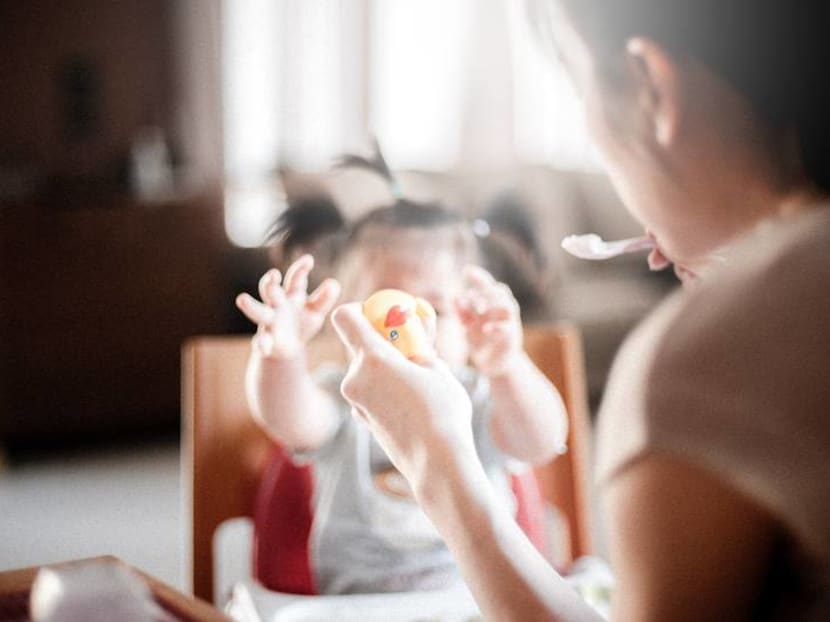commentary Commentary
Commentary: What happens when your babysitter ignores what you tell her
Some parents see no reason for their child to socialise, but Financial Times' Jo Ellison appreciates the things her child picks up from others.

A mother feeding her baby at home. (Photo: Unsplash/Tanaphong Toochinda)
LONDON: If you were to make a list of people with whom to share parenting tips, it seems likely that Russell Brand, the stand-up comedian, serial shagger, raconteur and former addict, would place fairly low. But I did feel a flicker of empathy while reading a recent interview in which the reformed reprobate described his aversion to children’s play dates.
“There’s nothing playful about a play date,” he said.
It’s an unrestrained, unmanaged, dangerous experiment that places my precious, perfect little girl in the company of anonymous, unvetted potential a***oles.
Although the term barely existed until about 15 years ago, the practice of scheduling play dates during which one’s children might be socialised with other children of their own age — supervised by one or sometimes two sets of responsible adults — is one of the least avoidable features of middle-class parenting.
Where once upon a time children were encouraged to knock about a football outside the house, or find their fun on a local building site, today’s parents are required to while away their weekends engaged in child-focused outings and exchanges which, despite being disguised as recreation, are actually designed to ensure one’s offspring’s vaulting social advancement.
Planned in advance, and most often initiated by an adult representative via a stiff, formal text message, the play date has changed the texture of our children’s extracurricular interactions forever.
Sometimes, play dates can help forge life-long friendships — if not between the children, then at least among the parents. But just as often they can be ghastly: A brutal arena of inter-peer one-upmanship that serves only to expose one’s least attractive qualities as a carer — and human being.
Brand says everyone on a play date is a potential jerk. I’d say there’s no potential about it: It’s simply a matter of who will be found out first.
READ: The year of trials and tribulations, as the parent of a newborn, a commentary
PERFECT CHILD
Brand’s concern that his daughter might be ruined by such reckless interaction may have been extreme, but it recalled a recent conversation I had with a friend who articulated a similar anxiety regarding her own perfect two-year-old.
So pleased was she with her daughter’s development that she could see no reason to encourage much social intercourse. Play school, nursery, swimming lessons: All could be postponed.
And she had a point. Her child was delightful — engaging, sleep-trained, unfussy and generally very happy. Why would she place her in new and hostile environments where she might learn the art of the toddler tantrum, or discover things like crisps?
It’s only natural, I suppose, in the hyper-aware, super-vigilant, goal-orientated culture of 21st-century parenting that we should assume the perfect child exists. And, furthermore, that we can be the perfect parent to them.
But unless you plan on locking your offspring in a vault, children do become contaminated by the outside world. And thank God for that.
READ: So your child wants to be a YouTube star? A commentary
Around 12 years ago, on returning to work after maternity leave, I sent my daughter to a local childminder called Mary, a 60-year-old giantess from Donegal who listened patiently to my long list of caveats about what she should and shouldn’t do and then completely ignored them.
My daughter left the house each morning with a spare organic, recycled, wood-pulp nappy, a brick-weight tub of salt-free stew, and a strict nap-schedule tucked under her arm.
She would return, smelling suspiciously of prawn-cocktail flavoured snacks, dusted with digestive biscuit crumbs and armed with the ability to recognise any Nickelodeon character within a 10-second period.
The non-gendered wooden toys were cast aside as she became fixated with Disney princess dress-up clothes and a creche of plastic baby dolls who would call for their “Mama”.
For Christmas, Mary gave her a doll of her own. It had foul plastic limbs, a cotton-stuffed torso and an o-shaped hole for a mouth. My daughter called her Bebe. I rolled my eyes. The contamination in my perfect child project had quickly become a contagion.
READ: Can young working parents survive without a maid? A commentary
CONTAMINATION IS NOT SO BAD
Of course, in the matter of child rearing, I owe Mary everything. As my daughter got older, I’ve realised that the greatest pleasure in parenting is in that vast tranche of stuff — thought, opinion, interests, tastes — that children pick up in the “unrestrained, unmanaged, dangerous experiment” we call the outside world.
Brand wants to protect his children from the influence of others, but what could be more terrifying than a brood of identikit, posturing micro-Brands?
Conversely, the qualities I most admire in my daughter are those that least reflect me; her friendliness, her openness, her willingness to get stuck in. The childminder may have encouraged her addiction to crustless toast, but she was a far better role model than I will ever be.
My daughter still sleeps with Bebe every single night. And I’ve grown so attached to its now pathetically limp little body that I recently had her scanned via a 3D printer and cast as a miniature silver pendant, just to make sure she never gets lost. Read what you will into that, Freud fans.
Anyone who thinks they can “manage” parenting is an eejit. The magic only happens when the plan goes slightly wrong.
© 2019 The Financial Times Ltd.






